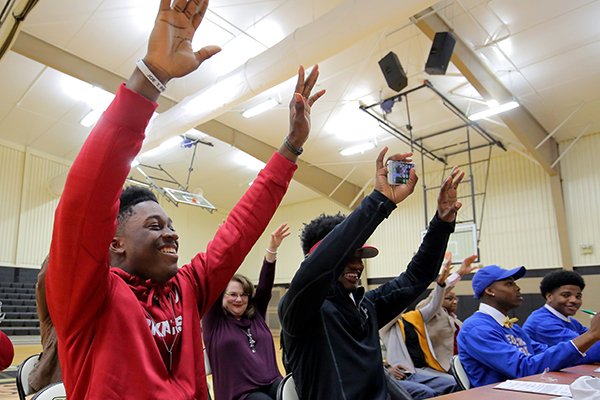FAYETTEVILLE — Arkansas coach Bret Bielema’s wish for an early football signing period has taken a step down the road.
In fact, the NCAA Division-I Council announced in a release Wednesday that it has approved passing proposals for early signing days in June and December.
Each period would have a 72-hour window for high school recruits to sign with their chosen school. The latter date would coincide with the junior college signing date in December. The traditional signing day would remain on the first Wednesday of February.
The Division-I Collegiate Commissioners Association - which provides governance oversight for the National Letter of Intent program - must approve the proposals for them to go into effect in 2017.
“The working group did a deep dive on recruiting from beginning to end, and I think what we came up with as a proposal is both student-athlete-friendly and coach- and staff-friendly,” said Bob Bowlsby, chair of the Football Oversight Committee and commissioner of the Big 12 Conference, in a release. “We hit a sweet spot.”
Bielema has long been a proponent of an early signing period and made that clear when asked about it at the SEC Spring Meetings in Destin, Fla., earlier this year.
“Change one recruiting rule? To be honest, it would be the early signing period,” Bielema said. “I have always been at a school where we don’t have free-flowing cash. We have to account for every penny we use, and I love it that way. I think an early signing period would cut down on a lot of costs.
“If he commits to us in say the spring of his junior year, he could sign somewhere like September first — or if we want to jump into June or July — if he could sign a piece of paper that commits him to us, we know that he couldn’t go anywhere else.
“So we don’t have to send a coach every week six different times to babysit him because lots of times there are seven other vultures (coaches) out there ready to go into schools if you are not there.”
Bielema thinks it will benefit both sides of the equation.
“It would eliminate the kids waffling, and it would also do this … the schools, the dozen or so who can go get who they want, although I realize they get beat sometimes, those schools may offer a kid and then there are no consequences when maybe a month out from signing day or sometimes a week out they start pulling scholarships offers when a kid has been committed to them for six to eight months," Bielema said.
“They (the kids) have bought T-shirts for the family for Christmas, and then all of a sudden you don’t have a scholarship. That ain’t right and that is an ugly part of our game that changes people’s lives.”
Bielema, who is against conditional offers, said it would let the kids know just how much they are wanted by coaches.
“If you had early signing period where a kid gets an offer and commits and then signs, it’s all good,” Bielema said. “Or, ‘Hey, you don’t want me to sign so you must not be (truly) committed to me.’
“I think that it would be an easy move that would take care of a lot of issues.”
Arkansas has 19 commits in its 2017 recruiting class, most of whom said they would rather sign early when asked about it this summer.
That includes Razorback pledge Devion Warren of (5-11, 170 pounds) of Monroe (La.) Parrish, who could be a wide receiver or defensive back for the Razorbacks.
“It would help them (signees) see anything is possible," Warren said, "but they would also know that the schools are committed to them.”

